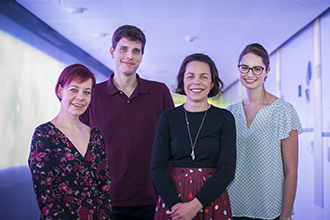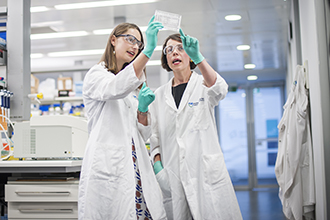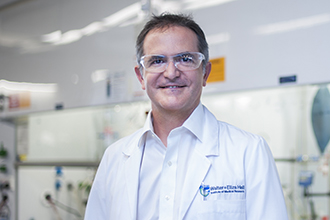Yeo S, Wong SQ, Atashrazm F, Behren A, Papenfuss AT, Vukelic N, Briggs L, Poh AR, Steinfort D, Smallwood N, Sutherland K, Naranbhai V, Parakh S, Leong T. Lung cancer biobanking in Australia: challenges and future directions. The Medical Journal of Australia. 2025;223(4):10.5694/mja2.70012
Doggett K, Morgan KJ, Olthof AM, Mieruszynski S, Williams BB, Garnham AL, Milevskiy MJG, Whitehead L, Coates J, Buchert M, O’Donoghue RJJ, Hall TE, Putoczki TL, Ernst M, Sutherland KD, Kanadia RN, Heath JK. Inhibition of the minor spliceosome restricts the growth of a broad spectrum of cancers. EMBO Reports. 2025;26(15):10.1038/s44319-025-00511-8
Hyslop SR, Corbin J, Gangatirkar P, Lebois M, Au AE, Moujalled D, Pleines I, Sutherland KD, Andrews RK, Gardiner EE, Alexander WS, Josefsson EC. A glycoprotein VI signaling defect in newly formed platelets generated in stress thrombopoiesis. Journal of Thrombosis and Haemostasis. 2025;23(6):10.1016/j.jtha.2025.02.035
Chen T, Ashwood LM, Kondrashova O, Strasser A, Kelly G, Sutherland KD. Breathing new insights into the role of mutant p53 in lung cancer. Oncogene. 2025;44(3):10.1038/s41388-024-03219-6
Kirk NA, Ng J, Ly K-L, Choi M, Ban YH, Dzhivhuho GA, Jang J, Ko K-P, Kareta MS, Park J-L, Karnezis AN, Thomas A, Sutherland KD, Park K-S. SMARCA4 loss promotes late-stage tumor progression in non-neuroendocrine small-cell lung cancer.Molecular Cancer Research. 2025;:10.1158/1541-7786.mcr-25-0592
Ng J, Cai L, Girard L, Prall OWJ, Rajan N, Khoo C, Batrouney A, Byrne DJ, Boyd DK, Kersbergen AJ, Christie M, Minna JD, Burr ML, Sutherland KD. Molecular and Pathologic Characterization of YAP1-Expressing Small Cell Lung Cancer Cell Lines Leads to Reclassification as SMARCA4-Deficient Malignancies. Clinical Cancer Research. 2024;30(9):10.1158/1078-0432.ccr-23-2360
Chen T, Lieschke E, Scott L, Boyd D, Sutherland K, Strasser A, Kelly G. Abstract LT06: Understanding the Role of Mutant TP53 in Lung Cancer Using Novel Genetically Engineered Mouse Models. Cancer Research. 2024;84(8_Supplement):10.1158/1538-7445.fcs2023-lt06
Ng J, Pan E, Johnston A, Ribera NT, Kersbergen A, Hess JB, Best SA, Tsui E, Steinfort D, Sutherland KD. A Multiplexed Approach to Assess Small Cell Lung Cancer Subtype Heterogeneity in Primary and Patient-Derived Tumor Samples. Methods in Molecular Biology. 2024;2806:10.1007/978-1-0716-3858-3_10
McDonald JA, Boyd D, Diepstraten S, Scott L, Tai L, Kueh A, Burr M, Best SA, Herold MJ, Sutherland KD. Abstract A043: Identifying critical vulnerabilities that sensitise Lkb1 -mutant lung adenocarcinoma to T cell mediated killing. Cancer Immunology Research. 2023;11(12_Supplement):10.1158/2326-6074.tumimm23-a043
Zeissig MN, Ashwood LM, Kondrashova O, Sutherland KD. Next batter up! Targeting cancers with KRAS-G12D mutations. Trends in Cancer. 2023;9(11):10.1016/j.trecan.2023.07.010






